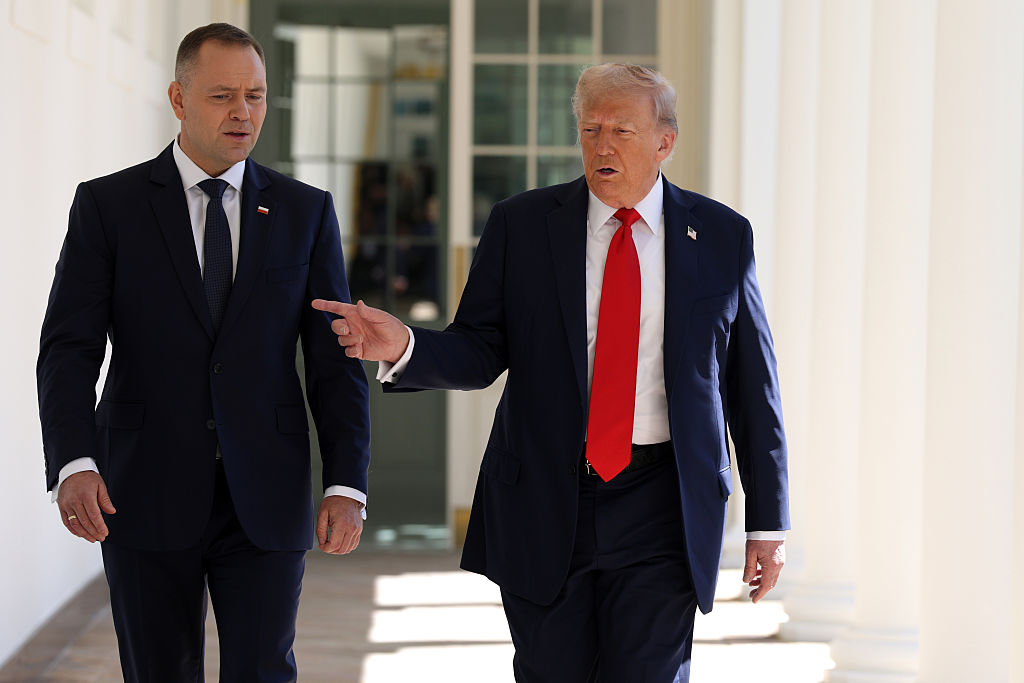Yesterday, September 3, President Trump welcomed Karol Nawrocki, the newly inaugurated president of Poland to the White House. It was a stirring occasion, replete with a surprise military fly-over of F-16 and F-35 fighter jets flying in “missing man” formation to honor Major Maciej “Slab” Krakowian, the Polish pilot who died in a crash in Radom, Poland, last Thursday.
Nawrocki, who narrowly won the presidency in June, is often described as “the Polish Trump.” It’s an accurate epithet. Nawrocki is as much a “Poland First” president as Trump is an “America First” president. The 42-year-old historian (Nawrocki…
Yesterday, September 3, President Trump welcomed Karol Nawrocki, the newly inaugurated president of Poland to the White House. It was a stirring occasion, replete with a surprise military fly-over of F-16 and F-35 fighter jets flying in “missing man” formation to honor Major Maciej “Slab” Krakowian, the Polish pilot who died in a crash in Radom, Poland, last Thursday.
Nawrocki, who narrowly won the presidency in June, is often described as “the Polish Trump.” It’s an accurate epithet. Nawrocki is as much a “Poland First” president as Trump is an “America First” president. The 42-year-old historian (Nawrocki holds a PhD in history) supports a list of policy initiatives that could have come right out of the MAGA playbook. In his inaugural address on August 6, he touched on several of these themes. Unlike his brethren in the EU, Nawrocki, a staunch Roman Catholic, emphasized Poland’s abiding “attachment to Christian values and identity.” Among those values, he noted, were “love and mercy towards other people,” including, he said with a perhaps a touch of irony, those who had vilified and lied about him during his campaign.
On more overtly political matters, Nawrocki affirmed that at the center of his “Plan 21” platform were two negative imperatives: “no” to illegal migration “no” to adopting the euro. Poland would maintain its own currency, and thus its independence from the encroachments of the EU not only on matters of illegal immigration but also on such subjects as energy (Nawrocki is pro-nuclear energy) and the florid sexual exoticism of LGBTQ+ and transsexual activists.
During his meeting with Trump in the Oval Office, Nawrocki stressed his commitment to bolster Poland’s contribution to NATO. It already stands at 4.7 percent of GDP, he noted, one of the highest in the EU, and his goal is 5 percent.
Trump endorsed Nawrocki last spring and it was clear that the two men have a lot in common. Both are pro-growth, pro-law and order (Nawrocki is an independent but is supported by the conservative Law and Justice party), and pro-national sovereignty. And just as Donald Trump has been wildly castigated (and indicted) by agents of the globalist, deep-state establishment, so Nawrocki has been the object of a campaign of vilification by the usual suspects. The Polish American, anti-Trump writer Anne Applebaum, for example, has dismissed Nawrocki as an “authoritarian populist candidate” and advocate of “blood-and-soil nationalism.” The side-long allusion to the diminutive Austrian house painter with the funny mustache was not adventitious.
In fact, Karol Nawrocki is one of a new breed of politically mature populist leaders in Europe, among whose number I would include Italy’s Giorgia Meloni and Hungary’s Viktor Orbán. These are leaders who have rejected the malicious hot-house utopianism of open borders and fantasy politics in which a nurturing past is exchanged for a congeries of militantly superficial and enervating liberal clichés. If leaders like Karol Nawrocki represent the future of Europe, Europe’s future will be bright. Donald Trump saw that instantly, which is why the two men exhibited such obvious rapport and camaraderie in the Oval Office. I predict that meeting marked the beginning of a beautiful friendship.
![]()

